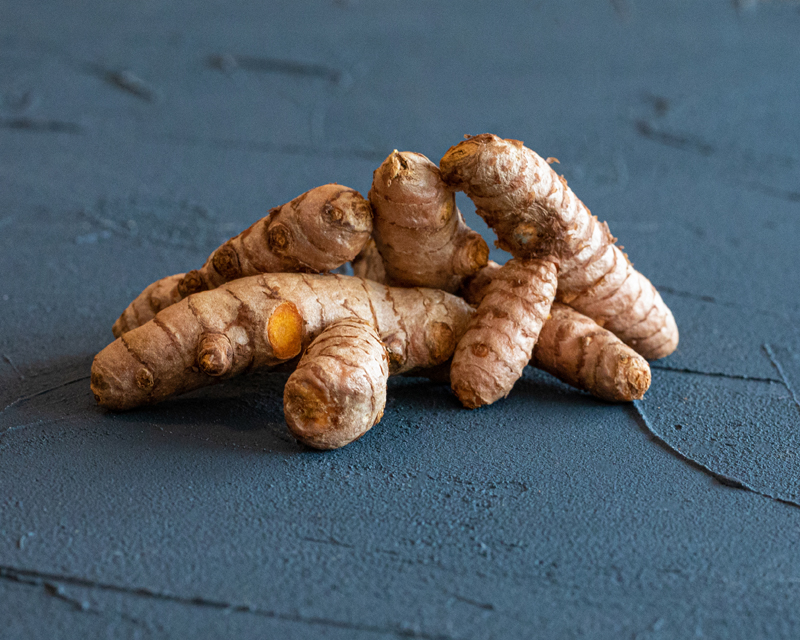Organic turmeric root
From 1.95€
Turmeric, a bright golden spice, is a staple in many cuisines and traditional medicine systems around the world. Whether consumed fresh or dry, turmeric has impressive health benefits thanks to its active compound curcumin. Turmeric, or Curcuma longa, is a plant in the ginger family (Zingiberaceae) that originates from South-East Asia and has been revered for its healing properties for thousands of years. Its benefits are supported by traditional systems of medicine such as Ayurveda and Traditional Chinese Medicine (TCM), as well as by modern scientific research.
It’s no secret that anything unprocessed has more nutrients. Curcumin is more abundant in fresh turmeric than in powdered form. Some curcumin is lost during the processing stage. Raw turmeric also contains more essential oils than processed turmeric, as drying and processing lose some of its essential oil value.
Health benefits of turmeric
Dried turmeric has a longer shelf life than fresh turmeric, making it convenient to store and use for a long time.
While fresh turmeric has a higher curcumin content, dried turmeric powder is more concentrated, making it an effective way to consume higher doses of curcumin.
Dried turmeric is ground into a powder, making it easy to add to a wide range of recipes, teas and food supplements.
Studies show that curcumin in turmeric powder can inhibit the growth and spread of cancer cells, demonstrating the potential for cancer prevention and complementary therapy.
The neuroprotective properties of curcumin in dried turmeric may help improve brain function and protect against neurodegenerative diseases such as Alzheimer’s.
Turmeric contains curcumin, which has a strong anti-inflammatory effect and can help with arthritis and inflammatory bowel disease.
The antioxidant properties of curcumin in fresh turmeric help to neutralise free radicals, protect cells from oxidative damage and reduce the risk of chronic diseases.
Rich in vitamins, minerals and essential oils, fresh turmeric boosts the immune system and strengthens the body’s defences against infections and diseases.
Fresh and dried turmeric stimulates bile production, aids digestion and improves gut health.
Due to its anti-inflammatory nature, turmeric can provide natural pain relief for a wide range of conditions such as joint and headaches.
How to use turmeric for food
Fresh turmeric – grate or crush fresh turmeric and add it to curries, stews, soups, smoothies or teas.
Dried turmeric – add dry turmeric powder to soups, stews, rice dishes or lentil dishes, even sprinkle on salads for a warm and distinctive taste. You can also make tea, and golden milk with turmeric by mixing it with warm plant milk and a little sweetener.
Unfortunately, the curcumin in turmeric is poorly absorbed into the bloodstream. This reduces its health benefits.
However, the addition of black pepper may help. Studies confirm that the combination of black pepper piperine and curcumin in turmeric increases curcumin absorption by up to 2000%.
Combining turmeric with black pepper therefore increases its potential health benefits.
Side effects
Digestive problems – both dry and fresh turmeric can cause gastrointestinal upset, especially when used in large doses. It can cause bloating, gas and stomach discomfort in some people.
Turmeric should be avoided in cases of acute hepatitis, jaundice, gallstones, bile duct disease, ulcers and acidity.
Blood-thinning effects – Turmeric’s blood-thinning properties may increase the risk of bleeding, especially when taken in combination with blood-thinning drugs.
Conclusion
Both fresh and dried turmeric have many health benefits thanks to its active compound curcumin. Whether you choose fresh turmeric for its intense flavour or dry turmeric for its convenience and concentrated curcumin content, incorporating this golden spice into your diet can certainly contribute to overall well-being and healthier living.
Sources:
https://www.healthline.com
https://www.hopkinsmedicine.org
https://www.banyanbotanicals.com
NOTE. The information contained herein should not be construed as a recommendation for treatment or other health issues. We encourage you to make personal decisions about your personal health, taking into account a wide range of sources of informations.
Organic fresh turmeric root 100%
Total fat 1g
Sodium 96 mg
Total carbohydrates 7g
- of which sugar 1g
Dietary fibre 2g
Dietary fibre 2g
Protein 0g
Store in a dry, cool place


